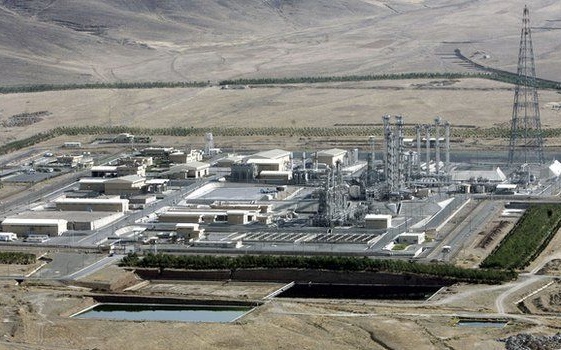The nuclear facility at Natanz in central Iran
Iran’s authorities have blocked an inspector from entering a nuclear facility, as Tehran stepped up its suspension of commitments under the 2015 nuclear deal with the 5+1 Powers.
The Atomic Energy Organization claimed the female monitor, from the International Atomic Energy Agency, was held outside the Natanz uranium enrichment plant last week when “the security control machines sounded the alarm and denied her entry”.
It said the inspector aborted her mission and flew back to IAEA headquarters in Vienna, Austria. The Organization claimed that it had reported the issue and asked for help “with investigations into the matter”.
But “Western diplomats” said the inspector’s travel documents were seized and she was briefly detained.
The IAEA’s 35-nation Board of Governors has been convened at short notice to discuss “two safeguards matters” on Thursday.
“The agency wants to show how seriously they are taking this. It is a potentially damaging precedent,” a Western official said.
A “European diplomat” said, “There is a real concern that it will harm how (the IAEA) carry out their inspections in the future.”
The Iranian mission at the IAEA said it will present a comprehensive report on Thursday.
Under the 2015 agreement between Iran and the remaining 5+1 Powers (UK, France, Germany, China, and Russia), 130 to 150 IAEA inspectors monitor Iranian compliance with “regular access, including daily access as requested…to relevant buildings at Natanz”.
Diplomats said the other “safeguards matter” on Thursday will be Iran’s cooperation with the IAEA over investigation of uranium traces at a site in Tehran.
Israel’s Prime Minister Benjamin Netanyahu declared the site a “secret atomic warehouse”. Iranian officials say that it was a carpet-cleaning facility.
The IAEA has declined to confirm that it found evidence of uranium, but diplomats said traces from samples taken in February were of uranium that was processed but not enriched.
On Tuesday, President Hassan Rouhani confirmed Iran’s fourth step suspending commitments under the 2015 nuclear deal, with injection of gas into advanced centrifuges for uranium enrichment.
Since late June, Iran has protested against the US withdrawal from the nuclear deal and comprehensive sanctions — as well as a failure to establish a European link to bypass those sanctions — by exceeding the deal’s limit on stocks of 3.67% enriched uranium, raising enrichment to 4.5%, and installing the advanced IR-4 and IR-6 centrifuges.
Rouhani said on State TV that the steps are reversible if other signatories to the deal “uphold their commitments”.
See EA on Monocle 24: Is the Iran Nuclear Deal Dead?; More Problems for Trump Over Impeachment
Iran Daily, Nov 5: Further Suspension of Nuclear Deal with Advanced Uranium Centrifuges
In February, the European Union launched a mechanism, INSTEX, to bypass US sanctions. But Tehran rejected the link because of “humiliating conditions” such as criticism of the Iran’s missile program, its activities in the Middle East, and its alleged involvement in assassination and bomb plots in Europe.
On Sunday the Supreme Leader ruled out any talks with the Trump Administration and belittled the mediation efforts of French President Emmanuel Macron.

